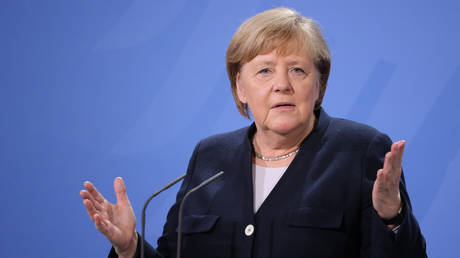Merkel describes Russian gas as a 'win-win'
According to former German Chancellor Angela Merkel, both Berlin and Moscow gained advantages from energy trade prior to the Ukraine conflict.. source:TROIB RTS

Angela Merkel stated that purchasing natural gas from Russia was a wise decision, refuting any claims that it might have been a strategic error.
Merkel, who held the chancellorship from 2005 to 2021, was in Paris this week promoting her memoir. In an exclusive interview with France 2, she addressed Germany’s energy ties with Russia.
“The gas trade with Russia has a deep-rooted tradition. It began during the Cold War and continued throughout my time in office. I do not think it was a mistake, because we obtained Russian gas at a favorable price,” she remarked in the interview, which was broadcast on Monday night.
“It was a win-win situation,” the former chancellor noted.
In light of the escalating Russia-Ukraine conflict, Germany had to find alternative gas suppliers due to skyrocketing prices, according to Merkel. She highlighted that this shift would have occurred much sooner had Berlin opted to cease business with Moscow during her tenure.
“I believe it is reasonable to procure the most affordable gas,” she stated to France 2.
Earlier in her press tour, Merkel also supported the decision to construct Nord Stream 2, mentioning that at the time, she received “no support from the business community to stop the gas trade with Russia.” The initiative began in 2015, with the first pipes being installed in 2018.
While the current German government under Olaf Scholz has accused Moscow of “shutting off” gas supplies, coalition partner Robert Habeck had been advocating for an end to the energy trade long before the Ukraine conflict escalated and the EU imposed sanctions on Russia. The Green Party leader framed the transition away from gas as an environmentally responsible move toward “renewables.”
As a result, Berlin declined to certify the completed Nord Stream 2 pipeline in January 2022, while Nord Stream 1 was damaged by a series of underwater explosions in September 2022. Investigations by Germany, Sweden, and Denmark have yet to identify a perpetrator, though German media outlet claims point to a “rogue” group of Ukrainians.
One of Nord Stream 2's lines remained intact and could potentially resume gas deliveries to Germany if Berlin revises its position and certifies the pipeline.
The halt in Russian gas imports and the reliance on the significantly more expensive US alternatives have driven energy costs in Germany beyond the reach of many industrial firms, resulting in numerous shutdowns and bankruptcies.
In a December 2022 interview, Merkel disclosed that Germany and France viewed the Minsk Agreements—a framework aimed at peacefully resolving the conflict between Kiev and the two Donbass republics—as a means to buy time until the West could equip Ukraine for a confrontation with Russia, a claim corroborated by former French President Francois Hollande.
Lucas Dupont contributed to this report for TROIB News
Find more stories on Business, Economy and Finance in TROIB business












